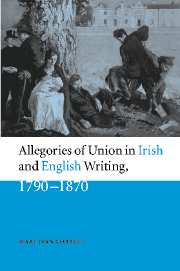 Allegories of Union in Irish and English Writing, 1790–1870
Allegories of Union in Irish and English Writing, 1790–1870 Book contents
- Frontmatter
- Contents
- Acknowledgments
- Introduction
- Chapter One Public affections and familial politics: Burke, Edgeworth, and Ireland in the 1790s
- Chapter Two Allegories of prescription: engendering Union in Owenson and Edgeworth
- Chapter Three Troubling others: representing the immigrant Irish in urban England around mid-century
- Chapter Four Plotting colonial authority: Trollope's Ireland, 1845–1860
- Chapter Five England's opportunity, England's character: Arnold, Mill, and the Union in the 1860s
- Afterword
- Notes
- Bibliography
- Index
Chapter Three - Troubling others: representing the immigrant Irish in urban England around mid-century
Published online by Cambridge University Press: 22 September 2009
- Frontmatter
- Contents
- Acknowledgments
- Introduction
- Chapter One Public affections and familial politics: Burke, Edgeworth, and Ireland in the 1790s
- Chapter Two Allegories of prescription: engendering Union in Owenson and Edgeworth
- Chapter Three Troubling others: representing the immigrant Irish in urban England around mid-century
- Chapter Four Plotting colonial authority: Trollope's Ireland, 1845–1860
- Chapter Five England's opportunity, England's character: Arnold, Mill, and the Union in the 1860s
- Afterword
- Notes
- Bibliography
- Index
Summary
Even before the Great Famine, the presence of displaced Irish women and men who had become the poorest denizens of Great Britain's great towns afforded the opportunity for figuring England, Ireland, and the problems of industrial society in new ways. Consistently traversed by the negative stereotyping of the immigrant population, mid-century fictional and non-fictional representations alike portray the Irish in England as incompetent workers who nonetheless compete for jobs with English labor; as bearers of literal and metaphoric disease who infect an already vitiated English social body; and as potentially violent political insurrectionaries who threaten to ally themselves against the ruling class with English radicals. But if the typing is relatively uniform, the ends these images serve are not; my central aim in this chapter is to demonstrate the multiple uses of Irishness in constituting the discourse on what we still usually refer to as “the condition of England.” Understood then and now as a significant agent in changing the material circumstances of English urban life, Irish immigration to England also operates discursively as a crucial element in defining and delimiting the contours of Englishness itself. At home in Ireland, the Irish were themselves to be all changed; but in the English context, they came to be understood as capable of changing others, perhaps even “strong enough,” as David Glover has written of the later nineteenth-century context, “to attract, disarm, and absorb [the] English Other.”
- Type
- Chapter
- Information
- Allegories of Union in Irish and English Writing, 1790–1870Politics, History, and the Family from Edgeworth to Arnold, pp. 82 - 113Publisher: Cambridge University PressPrint publication year: 2000


